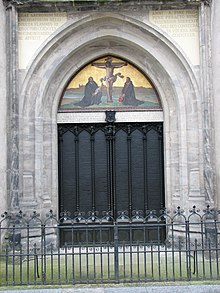Ask an American about Austria and you probably get a fairly short list. It usually starts with Sound of Music, the Alps and maybe Schwarzenegger. Sometimes Mozart is thrown in there, and don't they speak...German there? I don't blame them, as a mid-westerner I can barely tell the difference between New Hampshire and Vermont. If people have traveled here they talk about the beautiful mountain scenery, the cute villages and the grand cities. We have palaces and castles galore, but we also have churches. A lot of churches. We have many big beautiful churches. We have very old churches and very ornately decorated ones. The next thing you learn is that almost all of them are catholic. Austria is after all a very catholic country. Most of our bank holidays are connected to some saint or someone's ascension. The protestant church is a pretty small percentage of the population, and the free church is an even smaller slice of that slice.

In many protestant communities today is Reformation day. This is not just because they want an alternative to Halloween. On October 31, 1517 Martin Luther nailed his 95 Theses to the door of the church in Wittenberg. It was one of the definitive acts of the Reformation.
 |
| Charles V |
While many people know about the German and Swiss history connected to the Reformation, it is not well known how much of a role Austria played on both sides of the Reformation story. For example, if you've seen the 2003 Luther film you may remember that Charles V was the Holy Roman Emperor that called Luther to the Diet of Worms in 1521. There Luther makes his famous statement "Here I stand, I can do no other." What we often fail to remember is that Charles V was from the Hapsburg family. They were the ones to build up the Austro-Hungarian empire. They were kinda a big deal.
On the other side of it, you have the example of a young Catholic monk that moves to Waldshut in present day Germany in 1521. In the 1500s Waldshut belonged to Austria, because in the 1500s a lot belonged to Austria. His name was Balthasar Hubmaier. He was influenced by the Swiss reformers and reads the writings of Martin Luther and comes to faith in 1523. Five years later he has planted two Anabaptist churches and baptized thousands before being martyred in Vienna. His wife is killed 3 days later. At a point in the 1500s it is said that 90% of Austria was protestant. The gospel had exploded in Austria. "Winkelprediger" - literally corner preachers would preach in the streets, in the mines, and on farms across the country. It was a truly transformational time. Even after the counter Reformation, there are villages in the mountains that remain Protestant to this day. They trace their roots back to this time.
 |
| Balthasar Hubmaier |
All this to say there is an amazing tradition here in our country which we are excited to celebrate. We also pray that it will help Austrians understand that the free church is not some American splinter group. We want people to see that the values of the Reformation - Faith alone, Grace alone, the Scriptures alone - give us the chance to connect with the creator of the universe!
As we learn more about this and continue to celebrate milestones of the reformation (2021 will be the Diet of Worms, 2028 is Hubmaier's martyrdom and so on) we will continue to share with you.
 In many protestant communities today is Reformation day. This is not just because they want an alternative to Halloween. On October 31, 1517 Martin Luther nailed his 95 Theses to the door of the church in Wittenberg. It was one of the definitive acts of the Reformation.
In many protestant communities today is Reformation day. This is not just because they want an alternative to Halloween. On October 31, 1517 Martin Luther nailed his 95 Theses to the door of the church in Wittenberg. It was one of the definitive acts of the Reformation. In many protestant communities today is Reformation day. This is not just because they want an alternative to Halloween. On October 31, 1517 Martin Luther nailed his 95 Theses to the door of the church in Wittenberg. It was one of the definitive acts of the Reformation.
In many protestant communities today is Reformation day. This is not just because they want an alternative to Halloween. On October 31, 1517 Martin Luther nailed his 95 Theses to the door of the church in Wittenberg. It was one of the definitive acts of the Reformation.


No comments:
Post a Comment
Leave a note or thought here, One condition, you have to be nice. Who knows, you might spark a great discussion!